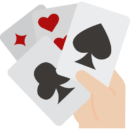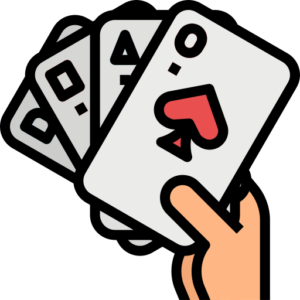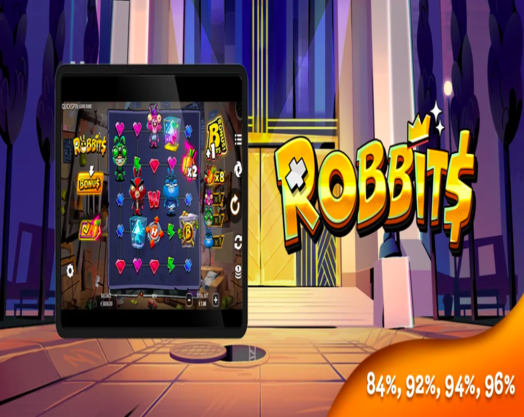Glossary Term
Advantage


Advantage
Used In: Blackjack
Introduction to Double Down
In blackjack, the term “advantage” refers to the balance of power between the casino and the player. By default, casinos have a slight mathematical edge due to the game's rules, such as players losing immediately if they bust, even if the dealer also busts. However, skilled players can turn the tide using techniques like card counting, which helps them track the remaining cards in the deck. This strategy allows players to bet more aggressively when the deck is rich in high-value cards, such as aces and tens, increasing their chances of getting strong hands like blackjack.
Beyond card counting, players can use various betting strategies to maximize their advantage. For example, adjusting bets based on the dealer's visible card or the composition of the remaining deck can tilt the odds in the player’s favor. The concept of advantage play revolves around minimizing the house edge while capitalizing on favorable conditions. Although casinos generally monitor for these techniques, they are not illegal but do require skill and practice to be executed successfully
Origins of Advantage
The concept of “advantage” in blackjack evolved from the broader mathematical principles of probability and gambling strategy. While blackjack itself dates back to the 17th century with roots in French and Spanish card games, the idea of advantage play became prominent in the 20th century.
One of the earliest mentions of gaining an edge through strategy came from mathematician Edward O. Thorp in the 1960s. Thorp is considered the father of card counting after publishing his book Beat the Dealer, where he outlined how players could use probability and card tracking to shift the game’s odds in their favor. This was revolutionary at the time, as it demonstrated that blackjack could be beaten through skill, not just luck.
Since then, various methods to exploit this “advantage” have developed, such as card counting, shuffle tracking, and strategic betting. These techniques help reduce the casino's built-in edge, allowing players to capitalize on favorable situations during gameplay.


Explanation of Advantage in Blackjack
To take advantage in blackjack, players must rely on strategies that reduce the casino’s edge and increase their chances of winning. The most well-known technique is card counting, where players track the ratio of high to low cards remaining in the deck. High cards (tens and aces) benefit players by increasing the chances of hitting a blackjack or pushing the dealer to bust. By observing cards as they are dealt and adjusting their bets accordingly, players can place larger bets when the deck favors them and smaller bets when it favors the dealer. Mastering this technique requires practice, memory skills, and discretion, as casinos closely monitor for card counters.
Other methods include shuffle tracking and hole carding. Shuffle tracking involves following clusters of cards through the shuffle, allowing players to predict when a deck might be favorable. Hole carding focuses on catching glimpses of the dealer’s hole card, which offers key information for making decisions like whether to hit, stand, or double down. Regardless of the technique used, advantage play in blackjack demands patience, careful observation, and an understanding of game mechanics.
Why Going for the Advantage is Important
Advantage play is important in blackjack because it shifts the balance of power from the casino to the player. By using strategies like card counting or shuffle tracking, players can reduce or even eliminate the house edge, which is typically built into casino games. This allows skilled players to make informed betting decisions based on the composition of the deck, leading to higher chances of winning in the long run. Without these techniques, players rely purely on luck, where the odds favor the casino. Advantage play transforms blackjack from a game of chance to one of skill, making it possible for players to consistently beat the house.
advantage play, particularly through card counting, reduces the house edge in blackjack from its typical 0.5%-1% to a player advantage of up to 2% or more when done correctly
Strategy and When to Double Down
Knowing when to take advantage in blackjack is crucial for maximizing winning potential. One key moment is during favorable deck conditions. Players should look for situations where the remaining cards contain a higher proportion of tens and aces. This typically occurs after several low cards have been dealt, increasing the chances of drawing a strong hand. Skilled players often use card counting to track these changes, allowing them to raise their bets when the odds shift in their favor.
Another strategic moment is when the dealer shows a weak upcard, such as a 4, 5, or 6. In these instances, the dealer is more likely to bust, providing a great opportunity for players to increase their bets. Understanding basic strategy helps players determine when to hit, stand, or double down based on the dealer’s visible card. By combining basic strategy with an awareness of the deck’s composition, players can make informed decisions on when to capitalize on their advantage.
Lastly, players should take advantage during specific game conditions, such as promotional events or favorable table rules. These might include games with a higher payout for blackjacks or fewer decks in play, which can improve the player’s odds. Staying informed about these factors can help players decide when to engage more aggressively at the table, thereby maximizing their potential for success.
The Most Key Examples of Advantage
Card Counting: One of the most common methods is card counting. For instance, if a player notices that a series of low cards (2-6) have been dealt, they might deduce that the remaining deck contains a higher proportion of high cards (10s and aces). This knowledge allows the player to increase their bets when they believe the deck is favorable, thus taking advantage of the improved odds of hitting a blackjack.
Dealer's Upcard: Another example is responding to the dealer’s upcard. If the dealer shows a 5 or 6, they are in a weak position and likely to bust. A player might decide to double their bet in this situation, knowing that the dealer is at a disadvantage. By doing this, the player can capitalize on the dealer's weakness and potentially win more money.
- Adjusting to Table Rules: Some tables offer favorable rules, like paying 3:2 for a blackjack instead of 6:5. If a player finds a table with better payout rules, they can choose to play there to enhance their overall advantage. Additionally, if a table allows doubling down on any two cards, a player can take advantage of this rule by doubling down when they have a strong hand against a weak dealer card.
- Back Counting: A more advanced technique is back counting, where a player observes games without participating until they determine that the deck is rich in high cards. Once the conditions are favorable, they can join the table and start betting aggressively. This strategy allows them to maximize their advantage without being involved in unfavorable hands.
Conclusion
In conclusion, understanding and utilizing advantage play in blackjack can significantly enhance a player's chances of winning. By employing techniques such as card counting, strategically responding to the dealer's upcard, and taking advantage of favorable table rules, players can effectively reduce the house edge. This approach transforms blackjack from a game of chance into one of skill and strategy, allowing knowledgeable players to consistently capitalize on favorable conditions. Mastering these strategies not only increases the potential for profit but also adds a deeper level of engagement and enjoyment to the game.
The Top Online Casinos for Gambling
To assist players in their quest for the best online casinos, reputable gambling authorities and industry experts meticulously evaluate and rank platforms based on various criteria such as licensing, game variety, user experience, payment options, customer support, and promotional offers. Several online casinos consistently rank among the top in the industry, offering a comprehensive suite of gaming options, secure banking methods, and responsive customer service.
welcome bonus
100%/€500 + 200 Free Spins
35x wagering (Deposit & Bonus)
welcome bonus
225%/€2,000 + 225 Free Spins
45x wagering (Deposit & Bonus)
welcome bonus
225%/€1,000 + 200 Free Spins + Secret Bonus
40x wagering (Deposit & Bonus)
welcome bonus
100%/€250 + 100 Free Spins
40x wagering (Deposit & Bonus)
welcome bonus
100%/€2,000 + 200 Free Spins
30x wagering (Deposit & Bonus)
welcome bonus
125%/€5,000 + 100 Free Spins
40x wagering (Deposit & Bonus)
welcome bonus
100%/€1,500
25x wagering (Deposit & Bonus)
welcome bonus
100%/€500 + 200 Free Spins + 1 Bonus Crab
35x wagering (Deposit & Bonus)
welcome bonus
100%/€500 + 200 Free Spins + 1 Bonus Crab
35x wagering (Deposit & Bonus)
welcome bonus
250%/€800 + 200 Free Spins
40x wagering (Deposit & Bonus)
Top 5 best casinos
$titl$ is not the Best Choice. Here are some better options:
Top 10 best casinos
$titl$ is RESTRICTED IN United States. Our Current Top Picks for United States are below:


Author
Branimir Ivanov | Senior News Contributor








